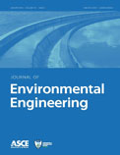
JOURNAL OF ENVIRONMENTAL ENGINEERING
Scope & Guideline
Shaping the future of civil infrastructure through rigorous research.
Introduction
Aims and Scopes
- Water Treatment Technologies:
Research in this area covers various methods for treating water, including advanced oxidation processes, bioreactors, and membrane technologies. Studies often explore the efficiency of these technologies in removing contaminants such as heavy metals, pharmaceuticals, and pathogens. - Sustainable Waste Management:
This scope encompasses strategies for managing solid and liquid waste, including composting, anaerobic digestion, and bioremediation techniques. It emphasizes the recovery of resources and the minimization of environmental impacts. - Pollution Prevention and Control:
This area focuses on methods to prevent pollution at the source, including strategies for reducing emissions from industrial processes and urban runoff. Research often includes modeling and assessment of pollution control technologies. - Environmental Impact Assessments:
The journal publishes studies that evaluate the environmental impacts of various projects and policies, using quantitative and qualitative methods. This includes assessments of infrastructure projects, industrial activities, and urban development. - Climate Change Mitigation and Adaptation:
Research in this scope addresses the impacts of climate change on water and environmental systems and explores engineering solutions to enhance resilience. This includes studies on carbon capture, sustainable infrastructure, and adaptive management strategies. - Emerging Contaminants and Environmental Health:
This area investigates the presence and effects of emerging pollutants, such as PFAS and microplastics, in the environment. Research often focuses on detection methods, fate and transport modeling, and health risk assessments.
Trending and Emerging
- Advanced Materials for Water Treatment:
Recent publications highlight the use of novel materials, such as biochar and nanomaterials, for enhancing water treatment processes. This trend is significant as it addresses the need for more effective and sustainable methods to remove pollutants. - Digital Technologies and Modeling:
There is an increasing focus on the application of machine learning, artificial intelligence, and other digital technologies for modeling and optimizing environmental systems. This trend reflects the growing importance of data-driven approaches in environmental engineering. - Microbial Solutions and Bioremediation:
Research is increasingly emphasizing the role of microorganisms in environmental remediation and wastewater treatment. This includes studies on microbial fuel cells and bioaugmentation techniques, which leverage natural processes for pollution control. - Climate Resilience and Adaptation Strategies:
Emerging themes include the development of engineering solutions that enhance resilience to climate impacts, such as flooding and drought. Research in this area is crucial for sustainable urban planning and infrastructure development. - Integrated Water Resource Management:
There is a trend toward holistic approaches to water resource management that consider the interconnectedness of water systems, land use, and ecosystem health. This reflects a shift in focus towards sustainable and integrated environmental practices.
Declining or Waning
- Traditional Wastewater Treatment Methods:
There has been a noticeable decrease in studies focused on conventional wastewater treatment methods as researchers increasingly explore innovative and advanced technologies. This shift indicates a move towards more efficient and sustainable solutions. - Chemical Approaches to Pollution Control:
Research centered around purely chemical methods for pollution control is becoming less prominent, as there is a growing emphasis on biological and integrated approaches that offer more sustainable and environmentally friendly solutions. - Single-Discipline Studies:
The journal has seen a decline in publications that focus solely on one discipline without interdisciplinary approaches. There is a trend toward research that incorporates multiple disciplines, reflecting the complexity of environmental challenges.
Similar Journals
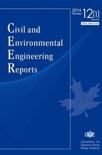
Civil and Environmental Engineering Reports
Exploring innovative methodologies for engineering excellence.Civil and Environmental Engineering Reports is a prestigious open access journal published by UNIV ZIELONA GORA, dedicated to advancing research in the dynamic fields of civil and environmental engineering. With its ISSN 2080-5187 and E-ISSN 2450-8594, the journal aims to disseminate innovative studies, methodologies, and practical applications that address contemporary challenges in these disciplines. Since its establishment in 2014 as an open access platform, it has emerged as a vital resource for researchers, professionals, and students alike, enabling free access to high-quality research findings. Situated at Licealna 9, Zielona Góra 65-417, Poland, the journal strives to foster collaboration and knowledge exchange within the global engineering community, making it an essential reading for anyone invested in civil and environmental engineering advancements.
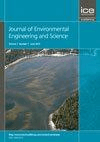
Journal of Environmental Engineering and Science
Navigating the Complexities of Environmental ChallengesJournal of Environmental Engineering and Science, published by Emerald Group Publishing Ltd, is a prominent academic platform dedicated to the dissemination of cutting-edge research in the fields of environmental engineering, chemistry, and science. This journal, with ISSN 1496-2551 and E-ISSN 1496-256X, features a comprehensive collection of studies that delve into innovative methodologies and practical applications aimed at solving pressing environmental issues. Having been published since 2002, it spans critical research years from 2015 to 2024, offering insights that are invaluable to both academics and practitioners alike. With its current rankings placing it in the fourth quartile for Environmental Chemistry and Engineering, and the third quartile in miscellaneous Environmental Science, the journal serves as a significant yet under-utilized resource for emerging scholars seeking to contribute to the ecological discourse. Though it does not offer Open Access, the content is meticulously curated to uphold academic rigor, catering especially to researchers, professionals, and students keen on advancing their understanding of environmental challenges and engineering solutions.
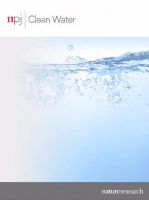
npj Clean Water
Championing global collaboration for water quality.npj Clean Water, published by NATURE PORTFOLIO, is a premier open-access journal dedicated to advancing the field of water science and technology. Since its launch in 2018, this innovative publication has quickly established itself as a leading platform for original research and policy discussions concerning clean water access and quality. With an impressive impact factor and categorized in the Q1 Quartile across multiple environmental science disciplines—including management, monitoring, pollution, and waste management—npj Clean Water stands out for its rigorous peer-review process and commitment to disseminating high-quality research. Researchers, professionals, and students involved in water-related challenges will find invaluable insights that address critical environmental issues and promote sustainable practices. Access to articles is freely available, encouraging global collaboration and knowledge sharing within the water sector. This journal embodies a significant step towards achieving innovation and policy advancements in the pursuit of a cleaner, safer water future.
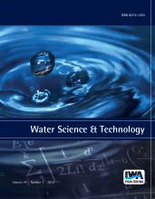
WATER SCIENCE AND TECHNOLOGY
Transforming challenges into solutions in water science.WATER SCIENCE AND TECHNOLOGY, published by IWA PUBLISHING, is a leading academic journal dedicated to advancing the field of water science and technology. With a rich history dating back to 1970, the journal provides a platform for innovative research and technological advancements, catering to the vital challenges faced within the realms of environmental engineering and water resource management. As evidenced by its strong ranking in Scopus, where it holds a position of #86 in Water Science and Technology and #77 in Environmental Engineering, the journal exemplifies significant scholarly contributions, reflected in its Q2 quartile status in both categories as of 2023. Although not an open access journal, WATER SCIENCE AND TECHNOLOGY ensures that its articles are widely available to researchers, professionals, and students passionate about sustainable water solutions. With a continued commitment to excellence, this journal plays a crucial role in shaping the discourse surrounding water quality, conservation, and technology innovation, making it an essential resource for all stakeholders in this critical field.

CANADIAN JOURNAL OF CIVIL ENGINEERING
Pioneering Research in Civil and Structural EngineeringCanadian Journal of Civil Engineering, published by Canadian Science Publishing, serves as a premier platform for the dissemination of innovative research and development in the fields of civil and structural engineering, as well as environmental science. Established in 1971, this journal maintains a robust reputation, achieving a Q3 ranking in both civil engineering and general environmental science categories as of 2023. While it does not currently offer open access, the journal is accessible to a wide audience of researchers, professionals, and students who are keen to stay abreast of the latest advancements in civil engineering practices. With a significant number of yearly publications and a committed editorial board, the Canadian Journal of Civil Engineering contributes to the foundational knowledge and practical applications in the engineering community, thereby playing a critical role in addressing contemporary challenges in civil infrastructure and environmental sustainability.
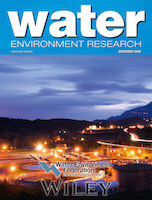
WATER ENVIRONMENT RESEARCH
Bridging research and practice for a healthier water ecosystem.WATER ENVIRONMENT RESEARCH is a leading scholarly journal dedicated to disseminating cutting-edge research in the fields of water science and technology. Published by WILEY, this esteemed journal (ISSN: 1061-4303; E-ISSN: 1554-7531) is renowned for its rigorous peer-reviewed articles that explore critical issues related to ecological modeling, environmental chemistry, pollution, and waste management. Established in 1992 and continuing through 2024, WATER ENVIRONMENT RESEARCH has secured a notable position within its category quartiles, ranking in the Q2 tier for several disciplines, including ecological modeling and water science and technology. It is highly regarded in the Scopus database, holding a rank of #53 out of 261 journals in Environmental Science related to Water Science and Technology, positioning it in the 79th percentile. As it continues to bridge research and practice, this journal serves as an essential resource for researchers, professionals, and students striving to advance knowledge and foster sustainable solutions within the water environment sector.

CHEMICAL AND PETROLEUM ENGINEERING
Advancing Innovations in Chemical and Petroleum EngineeringChemical and Petroleum Engineering is a prestigious academic journal dedicated to the advancement of knowledge in the fields of chemical engineering and petroleum technologies. Published by Springer, this journal serves as a vital resource for researchers, professionals, and students interested in the intricate processes and innovations that drive these industries. With an ISSN of 0009-2355 and an E-ISSN of 1573-8329, it has established a notable presence since its inception in 1965. Throughout its converged years, the journal has continually published impactful research that contributes to sustainability and efficiency within the sectors. Although it holds a Q3 ranking in Chemical Engineering and Fuel Technology and a Q4 ranking in Energy Engineering and Geochemistry, it is a noteworthy platform for emerging studies, fostering connections among scholars. Readers will find a wealth of information and ideas, but please note that this journal does not currently offer open access options. For those passionate about chemical and petroleum engineering, this journal is an essential part of staying informed and engaged with the latest scientific advancements.

Environmental Sciences Europe
Transforming environmental knowledge into action.Environmental Sciences Europe is a leading peer-reviewed journal published by SPRINGER, dedicated to advancing research in the field of environmental science, with a specific focus on pollution and its mitigation. Since its transition to Open Access in 2011, the journal has been committed to disseminating high-quality research without barriers, thereby ensuring that critical knowledge is freely accessible to researchers, practitioners, and policymakers around the globe. Based in Germany and with a commendable Q1 ranking in Pollution for 2023, the journal stands out in the Scopus rankings, occupying the 23rd position out of 167 in its category, reflecting its significant impact in shaping environmental discourse. With a convergence of global research efforts projected until 2024, Environmental Sciences Europe aims to provide a vital platform for scholarly communication and collaboration, ultimately contributing to sustainable solutions for pressing environmental challenges.
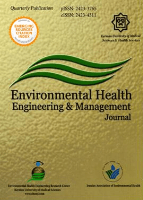
Environmental Health Engineering and Management Journal
Exploring Solutions for Healthier EnvironmentsEnvironmental Health Engineering and Management Journal is a premier platform dedicated to the dissemination of research findings in the essential field of environmental health. Published by Kerman University of Medical Sciences in Iran, this Open Access journal has been a beacon of scientific inquiry since its inception in 2014. With an ISSN of 2423-3765 and E-ISSN 2423-4311, it facilitates broad accessibility to cutting-edge research that addresses the complex interactions between environmental factors and human health. With a notable categorization in the Q3 quartile for Environmental Science and Public Health, alongside Q4 in Chemical Health and Safety, the journal underscores its commitment to quality and relevance. Currently ranked #132 out of 233 in Environmental Science within Scopus, it serves as a crucial resource for researchers and practitioners striving to tackle contemporary environmental challenges. The journal's scope includes innovative methodologies, environmental risk assessment, and sustainable health practices, positioning it as an indispensable reference for those invested in improving public health outcomes through environmental engineering and management.

Environmental Science-Advances
Transforming environmental insights into action.Environmental Science-Advances, published by the esteemed Royal Society of Chemistry, is a pioneering open-access journal dedicated to advancing the field of environmental sciences. Having commenced publication in 2022, this journal serves as a vital platform for the rapid dissemination of high-quality research covering a broad scope, including environmental chemistry, pollution management, water science and technology, and environmental engineering. With its commitment to open access, it ensures that vital environmental research is freely available to researchers, professionals, and students worldwide, thus fostering collaboration and innovation in addressing pressing environmental challenges. Currently, the journal is ranked in the Q2 and Q3 quartiles across various categories such as Environmental Engineering and Water Science, indicating its growing influence within the academic community. With the global imperative for sustainable environmental solutions, Environmental Science-Advances is positioned to become an invaluable resource for those dedicated to the study and solution of environmental issues.